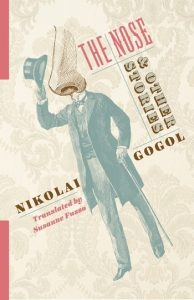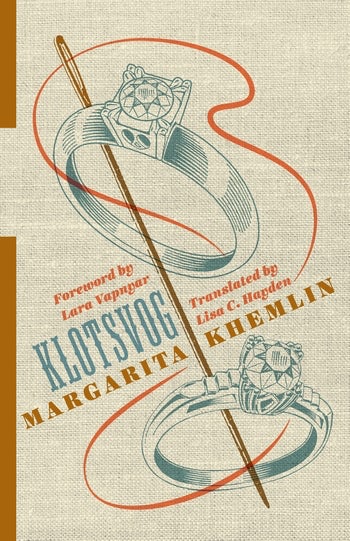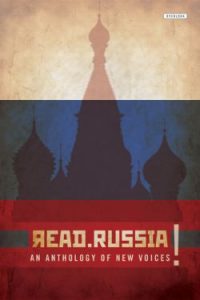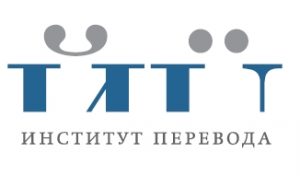
Christine Dunbar
This week, in almost the final interview of our blog mini-series on how the coronavirus is affecting Russian-to-English translators and the translation publishing industry, we spoke to Christine Dunbar, an editor at Columbia University Press, where she acquires literature in translation and scholarly and general-interest non-fiction about Asian culture. An erstwhile Slavist, her favourite part of the list is the Russian Library, a series of translations that spans Aleshkovsky to Zoshchenko, Avvakum to Maria Stepanova. Thanks to support from Read Russia, the books are available in affordable paperback editions with a gorgeous series design.
Quarantine, and fear for ourselves and our loved ones, have radically re-shaped how we think and behave. How have you adapted to your new working conditions?
CD: If the quarantine enmeshed me more tightly in my closest networks—I have been living at my sister’s, where I have spent hours on the phone with my father on lockdown in Italy, my grandparents in their upstate elder care facility, and my friends, many of whom are alone in their New York apartments—the blossoming of anti-racist protests over the last few weeks has brought me back to the wider world. The conversations I’ve been having with my colleagues have been hard, but so necessary. Being out of the office has made organizing less ad hoc, but that has some real potential benefits (more on this below).
What do you think will be the knock-on effect from lockdown on translation publishing? Are there advantages as well as disadvantages for people in the creative industry?
CD: Some of these advantages are bittersweet, but I do think there are cost-savings that will be carried through to the post-pandemic world. I think we’ll see more openness from book reviewers and outlets to digital galleys. I hope we’ll continue to see large numbers of virtual book events. I’ve attended some fabulous ones, and removing the limitations of geography from both the participants and the audience is a real boon. I hope these continue to be linked to bookstores, which play such an important role in connecting readers to books, whether or not those readers are browsing the shelves.
 I have mixed feelings about the potential effects on remote work. On a personal level, I have loved spending more time with family these past months. And I have never subscribed to the antiquated idea that publishing must happen in New York—how could anyone, with presses like Deep Vellum putting out such exciting books? But I have also seen two troubling trends. The Lee & Low Diversity Baseline survey shows that US publishing is 76% white, and editorial—my department—is a whopping 85% white. All white publishing professionals should be committed to changing those numbers, and a move to remote work can freeze our networks in place. This must not happen! If publishers encourage more remote work moving forward—whether due to employee preference or in pursuit of cost savings–we will need to take concrete steps to counteract this calcification, even as we act to make our organizations antiracist in other ways. The second concern is related. Many publishers have laid off or furloughed staff—often the most junior—during the pandemic. While one of the arguments for allowing remote work is that entry-level positions in publishing pay so little that only candidates from wealthy backgrounds can afford to take them (exacerbating, surely, the numbers above), there’s a real danger that publishers will use remote work as an excuse to pay even less, potentially creating a class of low-paid assistants cut off from avenues for advancement. This seems dystopian, but you can see it happening even pre-pandemic in some of the big for-profit scholarly publishers. To be clear, these are not arguments against remote work per se, but arguments for being intentional about the changes we are advocating for in the industry.
I have mixed feelings about the potential effects on remote work. On a personal level, I have loved spending more time with family these past months. And I have never subscribed to the antiquated idea that publishing must happen in New York—how could anyone, with presses like Deep Vellum putting out such exciting books? But I have also seen two troubling trends. The Lee & Low Diversity Baseline survey shows that US publishing is 76% white, and editorial—my department—is a whopping 85% white. All white publishing professionals should be committed to changing those numbers, and a move to remote work can freeze our networks in place. This must not happen! If publishers encourage more remote work moving forward—whether due to employee preference or in pursuit of cost savings–we will need to take concrete steps to counteract this calcification, even as we act to make our organizations antiracist in other ways. The second concern is related. Many publishers have laid off or furloughed staff—often the most junior—during the pandemic. While one of the arguments for allowing remote work is that entry-level positions in publishing pay so little that only candidates from wealthy backgrounds can afford to take them (exacerbating, surely, the numbers above), there’s a real danger that publishers will use remote work as an excuse to pay even less, potentially creating a class of low-paid assistants cut off from avenues for advancement. This seems dystopian, but you can see it happening even pre-pandemic in some of the big for-profit scholarly publishers. To be clear, these are not arguments against remote work per se, but arguments for being intentional about the changes we are advocating for in the industry.
What has been the impact on your work/industry of cancelled book fairs, book launches, speaker events and so on? Is there a danger that the English-speaking world will forget Russian culture?
CD: Absolutely not! As I said above, I really hope that we as an industry take everything we are learning about virtual events and think about how to keep them going. I would love to see more participation from authors and translators based in Russia, for instance. Marian Schwartz gave a fabulous presentation at the Chatham Translation Symposium last year titled “Our Golden Cage,” about how the global belief that Russian literature is “important” and “serious” can lend attention to our work, but it can also make it harder to pitch books—especially contemporary books—that do not play to those preconceptions. This is also something I’ve tried to do with the Russian Library—to show the funny side of Russian literature—from Boris Dralyuk’s translation of Zoshchenko’s Sentimental Tales to Duffy White’s translation of Aleshkovsky’s Nikolai Nikolaevich to Susanne Fusso’s translation of Gogol’s short fiction in The Nose and Other Stories (sorry, Marian, a classic, but at least not another Anna Karenina ?). Virtual events allow for new ways of thinking about the participation of contemporary Russian writers in publicity, and the 
 fact that they so easily result in recordings means that their marketing potential lives on well after the event (see, for example, this 2018 clip of translator Maya Vinokour reading from Linor Goralik’s collection Found Life, while Linor finds the next story on her phone).
fact that they so easily result in recordings means that their marketing potential lives on well after the event (see, for example, this 2018 clip of translator Maya Vinokour reading from Linor Goralik’s collection Found Life, while Linor finds the next story on her phone).
Are you aware of increased sales thanks to locked-down populations turning to books for relief? Could this be a golden moment for reading?
CD: Anecdotally, at least during the first part of the quarantine, I think a lot of would-be readers were finding it hard to muster the concentration for books. I think that is turning around now, and I know I for one have been buying a lot of books, much faster than I am reading them, in an attempt to support the many bookstores I want to see come through this. Whether or not you are having a reading-heavy quarantine, please support your local independent bookstore!
 And finally, if you follow Russian fiction translated into English, which book(s) do you think stand a good chance of winning prizes for translated fiction – such as the Read Russia Prize (2020)?
And finally, if you follow Russian fiction translated into English, which book(s) do you think stand a good chance of winning prizes for translated fiction – such as the Read Russia Prize (2020)?
CD: From Zuleikha to Solovyov and Larionov to the Russian Library’s Klotsvog to the brand new Three Apples Fell from the Sky (which I have yet to read but have ordered!), I wouldn’t bet against the fabulously talented Lisa Hayden this year (or ever).
Thank you, Christine! Next week we’ll be hearing from Will Evans, editor and publisher at indie publishers Deep Vellum , about their dedication to publishing Russian titles in translation and how they’re toughing out the crisis.

 No matter how well established a translator might seem to be, the freelance life is only as viable as the next contract, and up until a month ago, as I turned in the fourth and final volume of Aleksandr Solzhenitsyn’s documentary novel
No matter how well established a translator might seem to be, the freelance life is only as viable as the next contract, and up until a month ago, as I turned in the fourth and final volume of Aleksandr Solzhenitsyn’s documentary novel  There is no danger that the English-speaking world will forget Dostoevsky, Tolstoy, or Chekhov, but there is a tremendous danger that they will never have a chance to read, let alone forget, much of post-Soviet and especially twenty-first century Russian literature, given that interest in contemporary Russian writing already seemed at an all-time low, despite the work of several excellent independent presses and new efforts such as the
There is no danger that the English-speaking world will forget Dostoevsky, Tolstoy, or Chekhov, but there is a tremendous danger that they will never have a chance to read, let alone forget, much of post-Soviet and especially twenty-first century Russian literature, given that interest in contemporary Russian writing already seemed at an all-time low, despite the work of several excellent independent presses and new efforts such as the  This week RusTrans spoke to Peter B. Kaufman, President and Executive Director of
This week RusTrans spoke to Peter B. Kaufman, President and Executive Director of  What do you think will be the knock-on effect from lockdown on translation publishing? Are there advantages as well as disadvantages for people in the creative industry?
What do you think will be the knock-on effect from lockdown on translation publishing? Are there advantages as well as disadvantages for people in the creative industry?

 The Russian
The Russian

 optimistic, but this seems impossible to me.
optimistic, but this seems impossible to me.